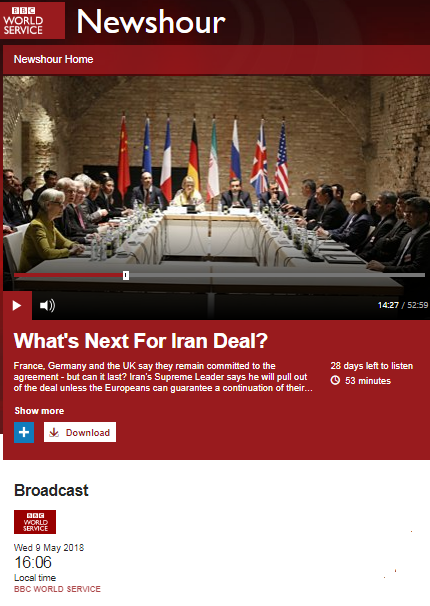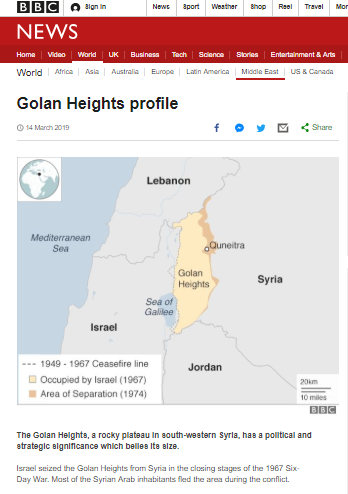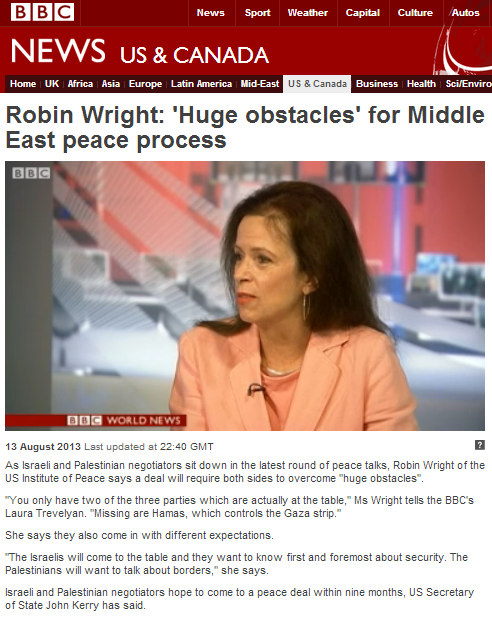Ever since the BBC began covering the media-orientated ‘Great Return March’ at the end of March it has avoided providing its audiences with a clear picture of the bodies behind its conception and organisation.
BBC audiences have however heard repeated promotion of the theme of Palestinian ‘ancestral lands’ and that was again the case in the introduction given by presenter James Coomarasamy to a report by the BBC Jerusalem bureau’s Yolande Knell which was aired in the May 9th edition of the BBC World Service radio programme ‘Newshour‘ (from 14:08 here). [emphasis in italics in the original]
Coomarasamy: “Protests along Gaza’s border with Israel are expected to reach their peak in the coming week as Palestinians mark the 70th anniversary of what they call the catastrophe – the displacement of more than 700 thousand people following the creation of the State of Israel. At least 40 Palestinians have been killed and thousand [sic] injured during five weeks of demonstrations. Israel says that many of the dead were members of armed groups. Palestinians want the right to return to their ancestral homes which are now in Israeli territory. Israel rejects that demand, saying that it is a threat to its Jewish majority. Well, in the first of three reports about the key issues in the Israel-Palestinian conflict, our Middle East correspondent Yolande Knell considers the future of Palestinian refugees.”
Coomarasamy’s use of the euphemism “armed groups” obviously did not adequately clarify to listeners that some 80% of those killed during the six weeks of violent rioting to date have been shown to be linked to terror organisations.
Knell’s opening description of the ‘Great Return March’ agitprop severely downplayed its violent nature.
Knell: “A young Gazan man is shot by an Israeli sniper and raced to hospital. Palestinians have been hurling stones at soldiers across the border here and launching kites carrying fire bombs. Israel’s army says its troops open fire to stop anyone trying to cross the perimeter fence illegally and to protect Israelis living nearby from possible attacks. I’ve come to find out what’s driving these deadly demonstrations.”
Obviously after making that latter statement any serious journalist would have clarified the involvement of various Gaza Strip based terror factions in the organisation of the weekly rioting but Yolande Knell instead uncritically painted precisely the picture that the agitprop’s organisers wish to promote.
Woman: “We want to go back to our land. Those are our lands that the Jews took and this is our right.”
Knell: “In the protest camp I meet Najla. Like most of Gaza’s 2 million residents, she’s a refugee.”
Woman: “We have to return to al Aqsa Mosque and all our lands. All of the land is Palestine.”
Failing to explain which party initiated the “Arab-Israeli war” or why, so many decades later, Palestinian refugees are deliberately kept in that status and in refugee camps, Knell went on:
Knell: “In 1948 hundreds of thousands of Palestinians fled or were expelled from their homes as the Arab-Israeli war began. Today many of their descendants still live in refugee camps. Past peace deals promised a fair solution but there are questions about what President Trump will now put forward in his promised peace plan. Another protester, Mohamed Rantissi, says this Gaza action sends a message.”
Rantissi: “It came in the critical time when the world neglected our rights of return back. They are trying their best to dissolve this Palestinian issue by what is called the Trump [unintelligible].”
Listeners then heard a relatively rare mention of the topic of Jewish refugees from Arab lands.
Knell: “Well I’ve moved now to Jerusalem’s bustling Mahane Yehuda market to get an Israeli perspective. Long before the country was founded this was a popular spot for Jewish stall holders who’d come from other parts of the Middle East but many more arrived in 1948 and the years that followed. They were Jewish refugees escaping persecution.”
Man: “We have the Kubeh soup which is sort of dumplings stuffed with meat in a vegetable soup. This is the most popular food because you have many Jewish Israelis that come from Iraq, Syria, Turkey, the Kurds Jewish; this is the traditional food.”
Knell: “Moshe Shrefler works in his father’s restaurant Azura.”
Man: “My father was born in Turkey and was having a problem with the Turkish people because they didn’t like their Jewish neighbours and my mother she came from Iran with all the family. They left everything over there and they came here just to save their lives.”
Knell: “Jewish refugees left behind land and property in Arab countries and were absorbed into the new Israeli state along with Holocaust survivors from Europe. Like many Israeli politicians former deputy foreign minister Danny Ayalon argues that Arab states must now assimilate Palestinian refugees, making them citizens – as most aren’t at present – and he questions the way the refugees have inherited their status.”
Ayalon: “If really there is an earnest and honest will to bring about peace in the Middle East, I think there is only one humane, fair and logical solution for the Palestinian refugees and this is either to absorb them where they are – remember, we are talking about second, third, fourth generation, you know, so they should be Lebanese, Syrians or whatever – or, if there is a Palestinian state, these refugees, if they want to leave their host countries, should go into this Palestinian entity.”
Knell then revisited a subject that was covered very generously by the BBC back in January and February but yet again BBC audiences heard no in-depth reporting on the issue of UNRWA’s purpose, its agenda, its record or its efficiency.
Knell: “Here in Amman there’s a rally in solidarity with the protesters in Gaza. Across the Middle East there are 5 million Palestinian refugees supported by the UN agency UNRWA. This year UNRWA’s biggest donor, the US, cut the donations it planned to give, saying it needed to make reforms and now in Jordan there’s concern about what that could mean financially and symbolically. Muhammad Momeni is the information minister.”
Momeni: “We have more than 2 million Palestinian refugees living in Jordan and hundreds of thousands of students in UNRWA schools.”
Knell: “So how worried is Jordan about this big hole in UNRWA’s finances?”
Momeni: “We’re very worried. Not only because it will immediately reflect on the type of services but also because it’s a political commitment by the international community to resolve the issue of the Palestinian refugees. If you stop financing UNRWA, basically you are telling the world that you are not committed to this issue any more and according to international resolutions, this is a final status issue and it must be dealt with through negotiation and in a way that will bring justice to them.”
Knell refrained from making any effort to clarify to listeners to which so-called “international resolutions” Momeni was referring – and whether or not they actually exist.
Knell: “Back at the Gaza protest camp there’s traditional Palestinian dancing. Here the case for right of return is uncompromising but Israel rejects that demand, pointing out it would destroy its Jewish majority. Leaks on previous peace talks suggest they focused on compensation for Palestinian refugees and return for just a token number. It remains to be seen what Washington will propose on one of the most painful issues in this long-running conflict.”
As we see, notwithstanding that rare mention of Jewish refugees, Knell’s report was essentially superficial. She failed to clarify that the whole point of the demand for ‘right of return’ is the destruction of the Jewish state and that Palestinian refugees have for decades been used by their leaders as pawns to further that aim. UNRWA’s role in keeping millions of Palestinians in refugee status was not explained to listeners and neither was that of the Arab League.
While giving the impression of balance with her visit to Mahane Yehuda and interview with Danny Ayalon, Knell nevertheless managed to both avoid the real issues behind the topic she ostensibly set out to ‘consider’ and promote a portrayal of the topic that amplifies the messaging of the ‘Great Return March’ organisers.
Related Articles:
Hamas agitprop requires BBC journalists to brush up on UN resolution
British connections to upcoming Gaza agitprop ignored by BBC News
BACKGROUNDER: The Palestinian Claim to a “Right of Return” (CAMERA)




